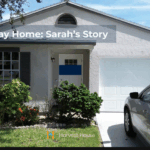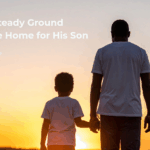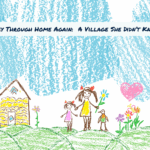Every year, we celebrate Veterans Day by honoring the men and women who serve our country and uphold our freedom. Many Americans would claim that there is no higher distinction. These citizens deserve respect and recognition, but more so, they deserve to live healthy and fulfilling lives after their service has ended. In reality, far too many veterans fall into a cycle of poverty and homelessness.
Veterans just like Alan. When Alan first joined the U.S. Navy, he felt like his life had been given a purpose. The time he spent serving his country kept him away from the negative influences of his youth. But after he left the military, Alan no longer had a support system. Two DUIs prompted him to lose his license, and from there he quickly spiraled down a destructive path.
“I was experimenting with drugs at that time. I really didn’t have any guidance, and I was pretty depressed. I lost any motivation for being a good person,” Alan recalled. He found himself in a dark place, without a home or a place to go. At that point, Alan didn’t care whether he lived or died.
Unfortunately, Alan’s story is not unique. Higher rates of physical and emotional trauma, substance abuse, and unemployment make veterans twice as likely to become homeless than non-veterans. Although these individuals are revered for their service, there is a monumental lack of programs and social networks to help returning soldiers adjust to civilian life.
One night, when Alan had no hope left, he reached out to a friend. That friend gave Alan the lifeline he so desperately needed—he told him about Harvest House. Alan’s friend came right away to pick him up and brought him to Harvest House that very night, just three years ago.
“They took me right in with open arms,” Alan said. It was a rough start, and it took him a few weeks to adjust, but soon Alan realized he was now a part of a loving and accepting community. “I had a lot of accountability, which I wasn’t used to,” he stated. Before Harvest House, Alan had only ever focused on making it through the next hour or the next day. Now, things were different. “I started seeing a future.”
At Harvest House, we believe that every person, including our veterans, has the right to a safe and stable place to live. Our VETS (Veterans Empowered through Transitional Services) program assists veterans in need by offering housing set in a therapeutic community, recovery and life skill classes, and case management services. However, with the recent decrease in federal funding for programs like VETS, Harvest House and other non-profits must turn to the generosity of the community in order to continue service for our veterans. It’s only through the support of donors like you that we can help individuals transition to healthy, independent lives.
Harvest House helped Alan do exactly that. During his time in the program, he worked hard to save money so he could regain his driver’s license. Next, Alan built his own company from the ground up—he bought a truck and chainsaws, got his LLC, and started a tree removal service. “It’s going really well,” he exclaimed, “I’m really excited to see where it goes.”
Alan has been living in his own apartment for nine months now and runs a successful business, but he is still heavily involved in the Harvest House community. He hires Harvest House clients to work at his company and ministers to others because he knows what it’s like to need help. “I stay connected. I keep going to church and keep going to meetings because I don’t ever want to go back. Harvest House has become my family, and I don’t want to walk away from my family.”
“Harvest House saved my life. They were an open door when I didn’t have anywhere else to go, and I am eternally grateful for this place.”





